Key takeaways:
- Crypto mining earnings are considered taxable income, and meticulous record-keeping of expenses and earnings is essential for accurate tax reporting.
- Investors must weigh the initial costs of setting up mining rigs and ongoing expenses against potential rewards, with considerations for joining mining pools to increase earning chances.
- Understanding tax obligations related to mining activities, including deductions for expenses like equipment and electricity costs, can significantly reduce the overall tax burden.
- Establishing a systematic approach for tracking mining activities and keeping detailed logs helps avoid complications during tax season and provides clarity when reporting earnings.
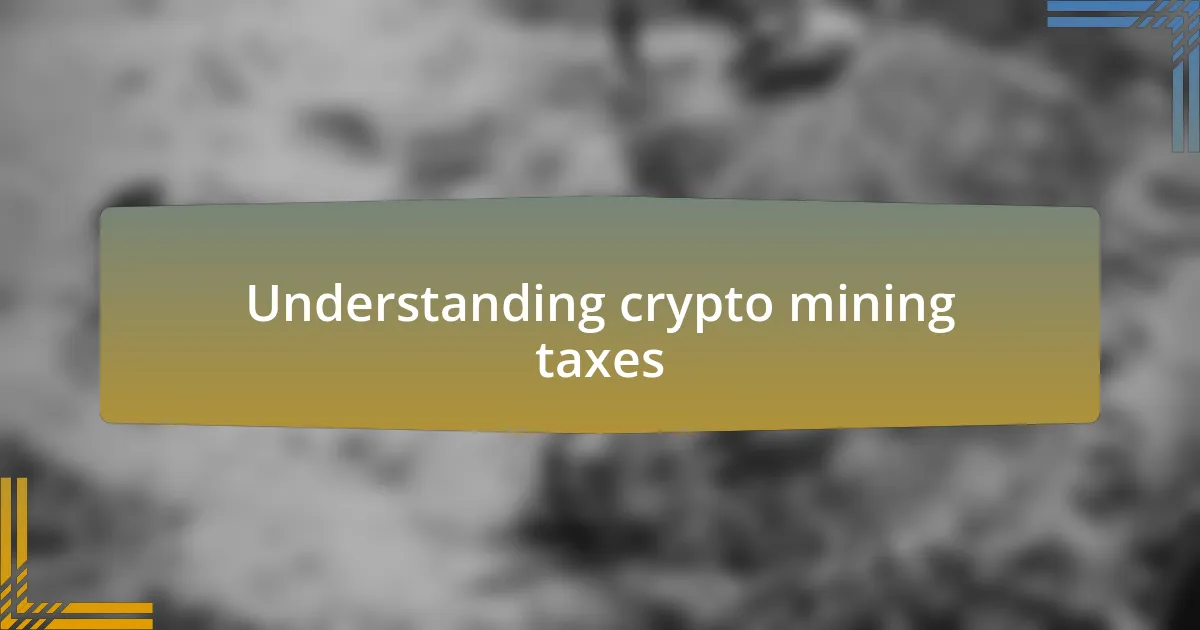
Understanding crypto mining taxes
When I first dove into the world of crypto mining, I was surprised by how much the tax implications could catch newcomers off guard. It’s easy to get swept up in the excitement of rewards and potential profits, but understanding that these earnings are considered taxable income is crucial. Have you ever realized that the gains from your mining efforts could be taxed just like your regular income?
Navigating the nuances of crypto mining taxes can feel overwhelming. For instance, when I sold my mined coins, I discovered that I had to determine whether I made a profit or a loss, based on the fair market value at the time of the sale. It made me realize how essential it is to track not just your earnings, but also the costs involved in mining, such as hardware and electricity—after all, those expenses can potentially reduce your taxable income.
Speaking with fellow miners, I’ve learned that keeping meticulous records throughout the year can save you from a lot of headaches when tax season rolls around. Many overlook this simple step, thinking it will be easy to remember everything later. But trust me—it isn’t! So, why not develop a routine to log your earnings and expenses? That way, when tax time comes, you’re not just scrambling to compile everything; you’re confidently aware of your financial situation.
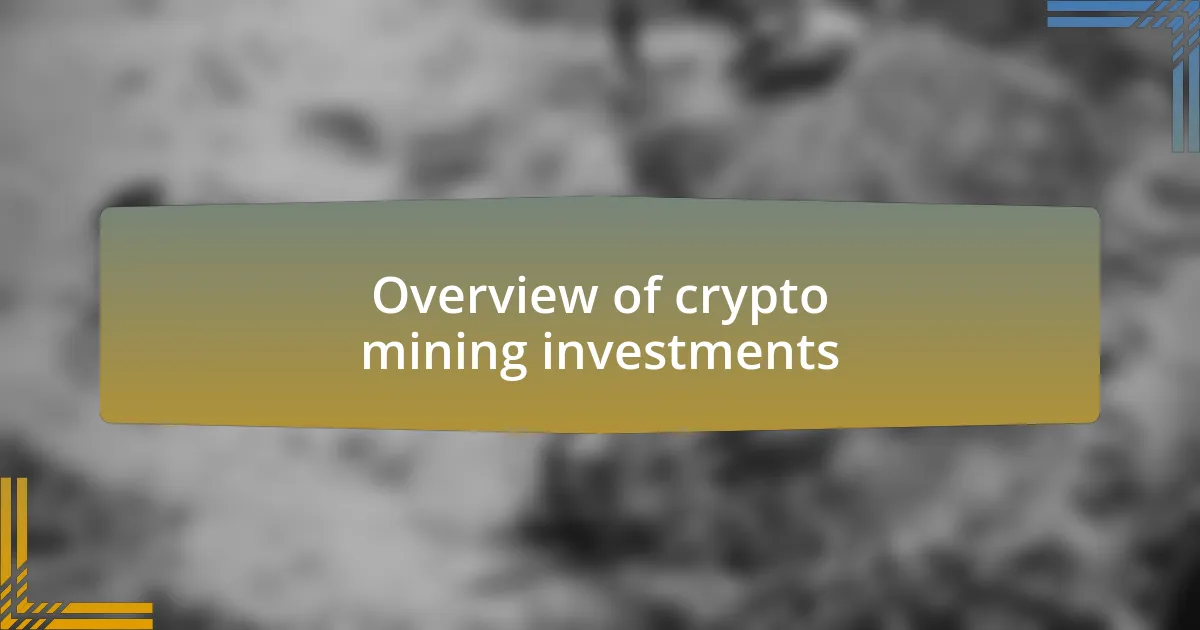
Overview of crypto mining investments
Investing in crypto mining can be an exhilarating journey, but it often comes with its own set of challenges. I remember when I first evaluated the cost of setting up my mining rig; the initial investment felt daunting, but I quickly recognized it as a critical step toward potential profitability. Each miner must weigh the expenses, including hardware, software, and ongoing electricity costs, against the expected rewards, which can fluctuate dramatically based on market conditions.
One aspect I found particularly intriguing was the evolution of mining pools, where miners band together to increase their chances of earning rewards. Joining a pool changed my perspective because it allowed me to access more consistent payouts, even if they were smaller. Have you ever thought about how collaboration could impact your own investments? By sharing resources and dividing the earnings, rather than going solo, miners can strategically navigate the volatile landscape of cryptocurrency.
Having been involved in mining for some time, I’ve observed that the landscape is constantly evolving with new technologies and regulations. For instance, I remember the excitement when ASIC miners became mainstream. They offered enhanced efficiency but often at steep prices. Staying informed and adaptable is vital; it’s not just about the initial investment but also about continuous learning and adapting to the industry’s shifts. What strategies have you considered to maintain your competitive edge in the mining arena?
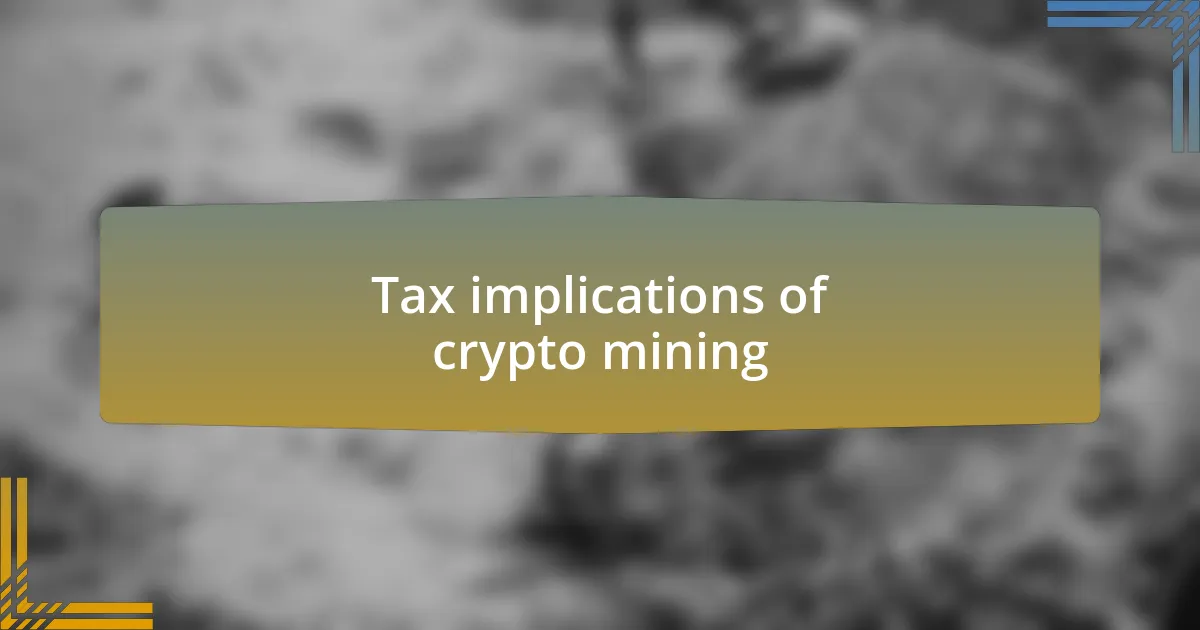
Tax implications of crypto mining
When it comes to the tax implications of crypto mining, I’ve learned that it’s crucial to understand how your mining activities are classified. Depending on your local laws, the income from mining can be treated as self-employment income. I found this out the hard way when I realized I needed to report everything, including rewards received and any realized gains. Have you thought about how those earnings can add up quickly, impacting your tax bracket?
One thing that surprised me was how important it is to keep meticulous records of my mining activities. I’ve started maintaining a detailed log of all expenses related to maintenance and equipment purchases because these can often be deducted. The tax landscape is so nuanced—did you know that the IRS views mining as a form of business? This perspective can really change the way you view your operations.
Additionally, I occasionally talk with fellow miners about the long-term implications of holding versus selling mined cryptocurrencies. When I mined my first Bitcoin, I didn’t realize that my decision to hold it for a year would lead to differing capital gains tax obligations. What has your experience been? Whether to sell immediately or hold for future appreciation can have significant tax consequences, and it’s a decision every miner should carefully consider.
![]()
Tracking your mining earnings
Keeping track of your mining earnings can feel overwhelming, but I’ve found that a structured approach makes it manageable. When I first started mining, I used a simple spreadsheet to record daily earnings and expenses, which provided me with a clear overview of my monthly yield. It’s fascinating how these little numbers add up over time, isn’t it? I often reflect on how that small diligence has paid off when tax season rolls around.
I learned the hard way how essential it is to track not just the total coins mined, but also the fair market value at the time of earning. When I first reported my income, I underestimated the importance of timing. Valuations can swing significantly, and keeping meticulous records helped me report accurately, avoiding any surprises from the tax authorities later. Have you ever wondered how those market fluctuations could impact your tax bill?
To further engage with my earnings, I set up alerts for crypto prices. This practice lets me note the exact moment I mined the coins, giving me more context for their value when I eventually sell. It’s like keeping a financial diary that not only tracks earnings but also captures the emotional journey of mining: those days when prices soar are unforgettable, while quiet markets present a different kind of lesson altogether. Have you considered how your emotional responses to the market could influence your mining strategies?
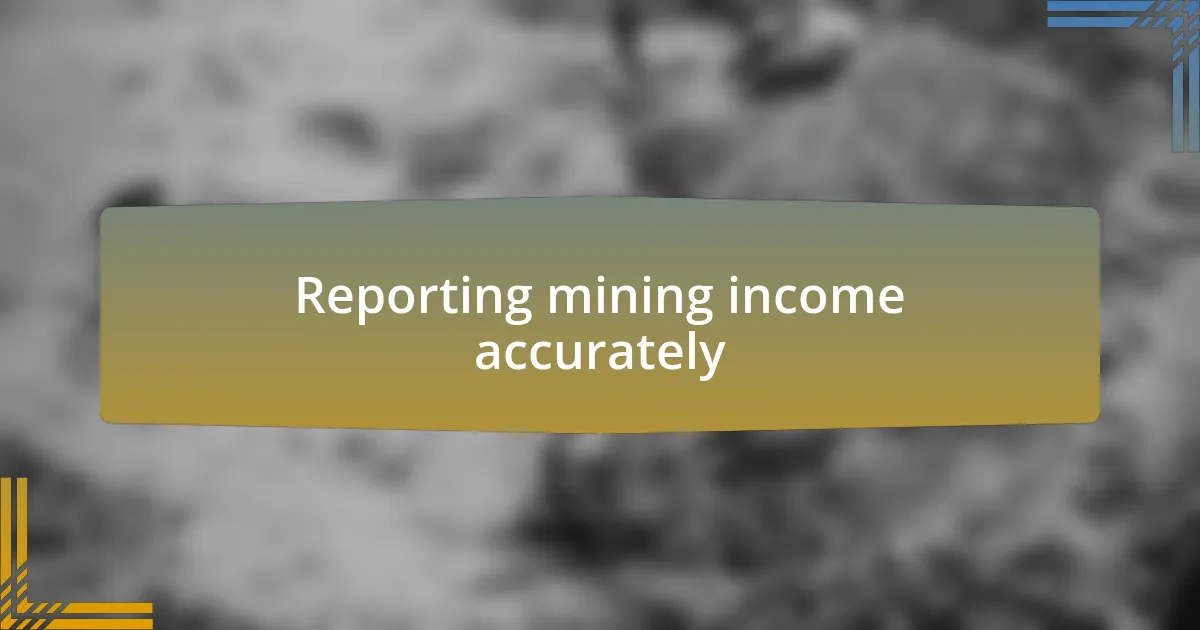
Reporting mining income accurately
When it comes to reporting mining income accurately, I’ve learned that clarity is key. I remember the first time I filed my taxes after mining; I was overwhelmed by the cryptic guidelines. What made a significant difference for me was breaking down my earnings into specific categories—like rewards from mining pools or solo efforts. This not only simplified my reporting but also made it easier to reference if any questions arose from the IRS later.
The fair market value at the time of mining can be a bit slippery. I learned this lesson firsthand one year when the value of my mined coins dropped shortly after earning them. I felt a pang of regret as I filed my taxes with lower valuations, realizing that I could have benefited from higher prices had I sold immediately. Have you ever thought about using software tools designed for crypto accounting? I found that integrating these tools saved me time and provided me more confidence in my reporting.
It’s also crucial to keep a clear timeline of when you mined each cryptocurrency, especially as values fluctuate. I used to overlook this detail, thinking that grabbing a screenshot of my mining stats was enough. But that habit changed when a tax auditor requested more precise dates. Each time I kept records in real-time, it struck me how these seemingly minor details could make a significant difference in proving my earnings. What systems do you have in place to ensure you’re capturing that information accurately?
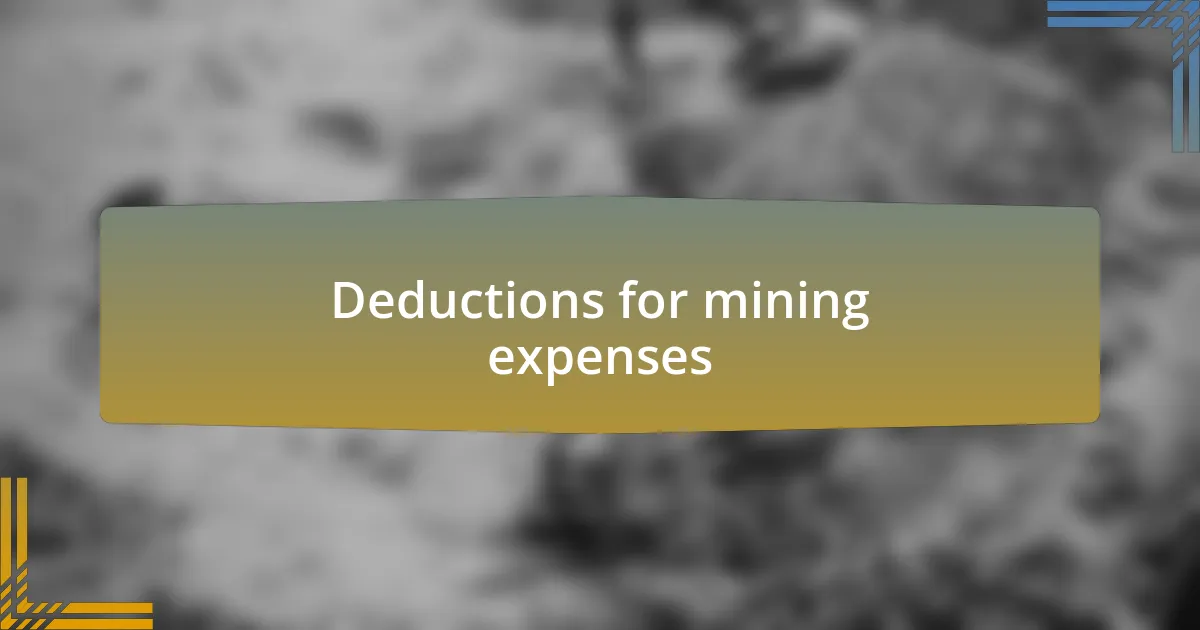
Deductions for mining expenses
When it comes to deductions for mining expenses, I quickly learned that they can significantly reduce my tax burden. I remember investing in top-notch cooling systems and power supplies to keep my rigs running efficiently. Recording these expenses was crucial; they don’t just add up—they can lead to tax savings that felt like a small victory during tax season.
One aspect I didn’t realize was deductible right away was my internet costs. I initially brushed this off, thinking it wasn’t significant enough to matter, but I soon adjusted my approach. Why not bring every eligible expense into the fold? After all, if you’re running a mining operation, those bills add up!
I also made it a habit to document any repairs or upgrades to my hardware. Just last year, I replaced a few GPUs due to wear and tear, and claiming those expenses felt rewarding. Have you taken the time to track how much you’re investing to keep your setup running smoothly? Those seemingly minor costs can turn into substantial deductions that help lighten the tax load when it matters most.
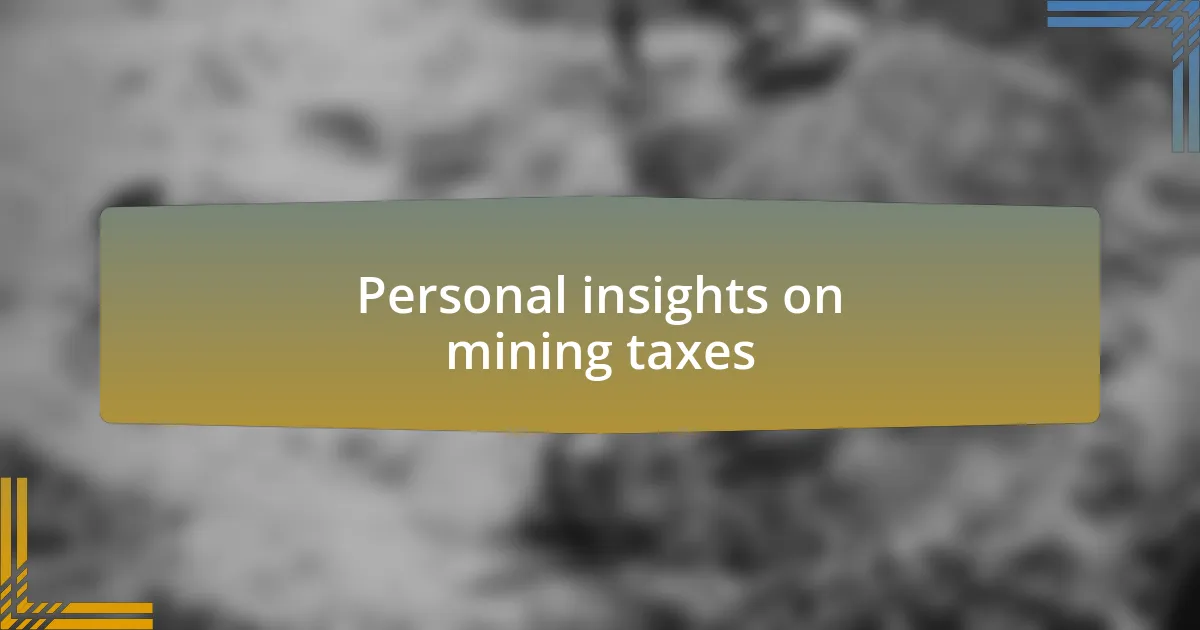
Personal insights on mining taxes
Understanding the intricacies of mining taxes really hit home for me when I realized how much I was missing out on. I remember a particular moment when I discovered that not just my equipment, but also the electricity costs could be claimed. It felt like unearthing hidden treasure in my financial records. Have you ever considered how much those monthly bills contribute to your overall investment?
On a more personal note, I once faced a situation where I hesitated to report earnings from my mining profits. I worried about potential audits and overestimating my figures. However, after delving into the regulations, I found clarity and peace of mind. It became evident that transparency pays off in the long run, and that initial anxiety transformed into confidence as I navigated my tax obligations.
Reflecting on my journey, I’ve learned that staying organized with my tax documents is not just a necessity but a lifeline. There was a time when I felt overwhelmed by the multitude of records I had to sort through, but I soon established a system that works for me. Have you thought about how a simple tracking method could make a difference in your own experience? Embracing this proactive approach not only simplified my annual process but also eased my mind during tax season, giving me one less thing to worry about.